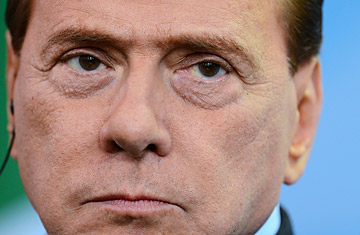
Italian Prime Minister Silvio Berlusconi
The caller didn't behave the way one ordinarily does when dialing into a late-night political talk show. But then, he wasn't an ordinary caller. "I've been watching a broadcast that's disgusting, that's being run in a way that's despicable, vile, repugnant," Italy's Prime Minister Silvio Berlusconi told host Gad Lerner during a live television show on Tuesday night. "I've heard theories that are distorted and far from the truth. I've seen a reconstruction of reality that's the opposite of the truth."
Lerner stood his ground but didn't have many chances to get a word in during Berlusconi's two-minute rant about what was being discussed on the program: the allegations that the Prime Minister had hosted elaborate sex parties at which he paid to sleep with young women, including a 17-year-old nightclub dancer. When Berlusconi insulted the show's guests, Lerner called him "vulgar and rude." And he responded to the Prime Minister's attacks by referring to the ongoing court process, in which Berlusconi has refused to participate. "Why don't you go to the judges, instead of delivering insults?" Lerner asked.
Berlusconi's political opponents were quick to pounce on the exchange as the behavior of a politician who, in the words of one parliamentarian, "has lost his sense of limits." But the reality is that the Premier was in his element. The environment in which the scandal is playing out is one that Berlusconi very much helped create. When he first launched his media empire, in the early 1980s, Italians had only black-and-white state-run channels to choose from, advertising was tightly controlled and even soccer matches were limited to just one a week — and they weren't aired until after the fact, to avoid affecting attendance.
Today Berlusconi's three private TV stations are all flash, trash and watercooler moments, with sports on every channel, along with game shows, quiz shows, soap operas and reality shows. "He's changed the collective imagination," says Candida Morvillo, editor of the Italian tabloid magazine Novella 2000. "His television programs describe a world where everything is glossy, where anybody can be famous, where there's no effort, where it doesn't take years and years of work to create a career. Today everyone wants everything right away and easy."
And for women, the message is clear: Use your looks. Many Italian shows feature young women in their underwear, smiling, dancing, swinging on poles. In Berlusconi's Italy, there's evidence that it works. The country's Minister for Equal Opportunity is a former topless model whom Berlusconi once told he would "marry in an instant." Nicole Minetti, one of Berlusconi's alleged co-conspirators in the prostitution case, is a former showgirl who was installed on the Prime Minister's ticket as a regional counselor. No surprise, then, that Italians aren't shocked by something as pedestrian as a prostitution scandal. "We're used to seeing half-nude dancers on television, even during dinnertime, while kids are watching television," says Morvillo. "It's like he was bringing his television shows into his home."
When it comes to politics, Berlusconi, a former adman, is a master of message, with a keen sense of what will play with the electoral masses. Along with the three TV stations his company owns, Berlusconi's political party controls the three public channels, giving him considerable control over the way information is presented to the public. By calling into Lerner's show on La7 — the country's only independent channel — it's likely Berlusconi was addressing his words not to the host but to those supporters who might need a reason to hold on.
Indeed, Berlusconi has lost little of his support during the two weeks since the scandal broke, says Nando Pagnoncelli, president of the polling firm Ipsos. To be sure, Berlusconi's popularity has been badly bloodied since last spring's regional election, when his People of Freedom Party won a solid 37% of the vote. But he still commands a position of strength. In a poll that was released on Tuesday, the People of Freedom Party came in first, with 27%. Asked whom they would want as Prime Minister, 17% of the respondents chose Berlusconi, more than any other potential candidate. "In our country, it's as if politics has been detached from morality, ethics, ideals," says Pagnoncelli. "Today politics is considered only government, administration." Voters make their decisions on the basis of practical or ideological factors. Sex scandals "are considered personal problems," Pagnoncelli says.
Besides, it doesn't matter how weakened a warrior is if there's nobody to stand up against him. Berlusconi's remaining supporters are, by definition, his most faithful. "They're people who don't read the papers and watch a lot of television," says Pagnoncelli. Meanwhile, the opposition is divided, unable to agree on a common platform and incapable of choosing a leader who could rally the 41% of voters who told pollsters they were undecided or would abstain if an election were held today.
And that's Berlusconi's secret. Accusations like the ones he is facing allow him to turn each vote into a referendum on his person, rallying wavering supporters behind what they see as a persecuted leader and sucking all the oxygen out of the political discussion. Though the allegations are as serious as any he's ever faced, if Berlusconi wasn't being accused of sleeping with underage women, he would be forced to answer questions about the failures of his government — the garbage crisis in Naples, the collapsing walls in the ruins of Pompeii, the stalled reconstruction after the 2009 earthquake in Aquila, the high rate of unemployment among the country's youth and the decade-long stagnation of the economy. And the opposition would similarly be forced to develop a platform of its own. No matter how damaging for Berlusconi's personal image, the scandals, when properly managed, can be good for him as a politician.
